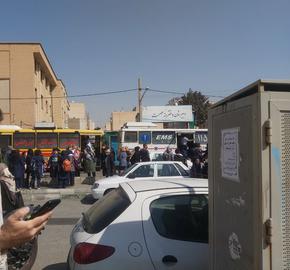At least 26 Iranian schools were targeted by chemical attacks on March 1, human rights groups say, as President Ebrahim Raisi ordered an investigation into a wave of illnesses at girls' schools across the country.
Over the past three months, hundreds of school students, mostly girls, have been treated for poisoning symptoms, including nausea, headaches, coughing, breathing difficulties, and heart palpitations.
It all started in late November in the city of Qom, south of Tehran, when dozens of shoolgirls fell ill and had to be transported to the hospital. Most were released shorty afterward, but several had to be kept for observation for several days.
Similar poisonings have since occurred in several other cities. The latest incidents were reported in Tehran, Ardabil, Shahinshahr, Karaj and Kermanshah.
Speaking at a cabinet meeting, Raisi said the Interior Ministry should probe the incidents, with help from the health and intelligence ministries, and quickly release the results to the public, according to state-run IRNA news agency.
Meanwhile, Shahriar Heydari, a member of the parliament’s National Security and Foreign Policy Commission quoted a “reliable” source as saying that “nearly 900 students from different provinces of the country have been poisoned."
It is unclear what may be causing the illnesses. Some of those affected have said they smelled chlorine or cleaning agents, while others said they thought they smelled “rotten tangerine” or “spearmint,” in the air.
Officials have only recently admitted there may be a problem, prompting some to accuse the government of purposely "poisoning" school children as retaliation for students and women leading anti-government protests sparked by the death of a 22-year-old woman, Mahsa Amini, in the custody of morality police.
There have also been speculations that Shia fundamentalists may have been involved in the incidents in a bid to prevent girls from attending school.
So far, no arrest has been announced in relation to the poisonings, which have sparked outrage among the families of the affected students. Some angry parents have refused to send their children to school.
visit the accountability section
In this section of Iran Wire, you can contact the officials and launch your campaign for various problems

























comments